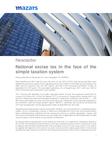
National excise tax in the face of the simple taxation system
Since taxable year 2013, with the entry into force of Law 1607 of 2012, food service providers were affected the economic results of their operations due to the creation of the National Consumption Tax (INC) and the exclusion from the VAT regime, and with it the consequent prohibition to take as deductible the VAT paid in the associated operations. As of taxable year 2017, with Law 1819 of 2016, franchises were immersed in such problem.
The Financing Bill alleviates the burden described above through the proposed amendment to numeral 3 of Article 512-1 of the Tax Statute ("ET") in the sense of, among others, stating that in "the service of dispensing food and beverages prepared in restaurants, cafeterias, self-service (.... )" the INC will be generated only when the service providers are "enterprises and companies registered in the unified tax under the simple taxation regime -SIMPLE", otherwise, the service will be taxed with VAT and consequently it will be appropriate to take as deductible the VAT paid.
Regarding the simple taxation regime (hereinafter "Simple"), we must say that it is a simplified taxation system, since it incorporates a series of rates that consolidate the income tax and complementary taxes (notwithstanding indicating that the occasional profit tax is settled separately), industry and commerce and complementary taxes and consumption tax (if applicable) whose taxable base is made up by the gross income without any purification whatsoever.
As representative characteristics of this regime we have that i) it is optional for individuals residing in the country who develop business directly or through companies whose income in the previous year is between $46,418,000 and $2,652,480. 000 (according to the UVT of the year 2018), ii) the rate to be applied will depend on the amount of gross income and the activity performed (in commercial activities the rates range from 2.6% to 5.6%; professional services: 5.6% to 9.6%; restaurant services: from 11.1% to 13.6%), iii) the payment of the contributions made to pension funds in charge of the employer (observing limitations) may be taken as a tax discount, as well as 0. 5% of the payments made by any electronic mechanism for sales, iv) they are not withholding agents (except for labor payments) or subject to withholding at source and self-withholdings, v) an annual SIMPLE return must be filed and bimonthly advances associated to it, as well as an annual VAT return with monthly payment of the amount collected.
As anti-abuse rules, the possibility of segregating the same operation among several companies that involve this regime is limited, as well as the use of this regime in situations that intend to disguise a possible labor contract. Thus, food service providers may choose to apply the Simple regime or, on the contrary, return to the VAT regime, which would entitle them to the deductible VAT. Additionally, in any case, it will be important to project the particular tax situation considering the eventual savings generated from the application of Simple.


